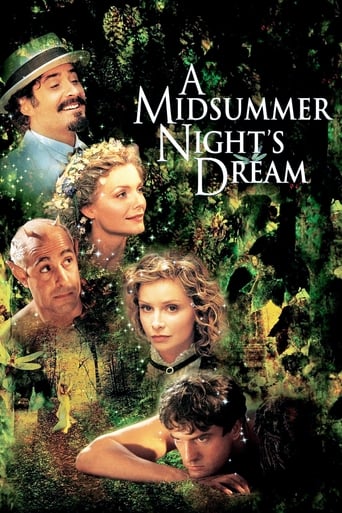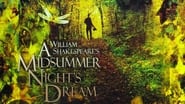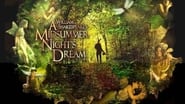Python Hyena
A Midsummer Night's Dream (1999): Dir: Michael Hoffman / Cast: Michelle Pfeiffer, Kevin Kline, Calista Flochhart, Rupert Everett, Stanley Tucci: Gloriously stunning fantasy that underlines our desire for love. Case in point, Calista Flockhart peddles after a frustrated male who is in love with another woman. Actors assemble for a play and Kevin Kline auditioning for all roles. Sighting all this are the fairies who live in the forest enchanted by a Queen. When the actors draw near to the forest twilight in preparation for their play, the magic begins thus leading to a quiet night of mist and stardust. Very funny with exquisite production and visual delight directed with wit and charm by Michael Hoffman who previously collaborated with Michelle Pfeiffer in the mediocre One Fine Day. Michelle Pfeiffer is stunning as the fairy Queen and Rupert Everett fools her with enchantment that will bring bewilderment and focus. Kline takes a strange transformation hair and donkey ears but will enact his true hilarity on the stage. Flockhart is hilarious in her naïve hopeless state. Stanley Tucci is hilarious as Puck who ends up screwing up all the romantic ties when sent out on his orders. Themes regard blind love that we often fall victim too. Appropriately moves from scene to scene is Shakespearean stage fashion, it is an enchanting masterpiece with a ravishing sense of wonder. Score: 10 / 10
vstb
This could have been a great version of MSND. It has a lot of good things in it. The cast is excellent and the director got great performances out of them (especially Anna Friel,Kevin Kline and Calista Flockhart). But it doesn't quite satisfy. Why?A Shakespeare play is like a Beethoven Symphony. No conductor would think of adding or deleting notes, let alone bars, from the 9th Symphony. The orchestra plays it as written to the best of their ability and their performance is judged on the level of excellence they achieve. It should be the same with Shakespeare's plays.Shakespeare was writing film scripts 300 years before the invention of the movie camera. He knew quite a lot about construction, pacing, characterisation and dialogue. If a screenplay changes any of these things it will probably diminish the effectiveness of the work. That is what has happened in this case. When will producers learn to put their trust in Shakespeare? This film starts with some nonsense about bustles and bicycles and then introduces a new character ( Bottom's wife ).What on earth made Mr Hoffman think he was improving Shakespeare with these interpolations? But even more damaging than the interpolations is the lack of any insight into what MSND is about.It seems to me that Shakespeare wanted audiences to think about 2 things after experiencing MSND ; 1. To what extent is our life shaped by our will and to what extent is it shaped by unseen forces we are not even aware of? That is why Hermia,Helena,Demetrius and Lysander come under the power of Oberon/Puck. Who has never fallen asleep firmly believing one thing and woken the next morning believing the contrary? Why? What has happened in our sleep? Shakespeare puts it down to fairies. Until someone comes up with a better explanation fairies it is! 2. The importance of self delusion in the pursuit of happiness. Philosophers say that to ," know thyself" is the path to happiness but Shakespeare knew better. His players are ecstatic at the end of the film because they think they have put in a performance that has dazzled the Athenian Court. Would they be happier if they knew the truth? Does this film stimulate its audience into thinking about these issues? I don't think so. That is another reason why it fails to satisfy.
William Brown (wdbrown)
Let me begin by saying that this is a beautifully acted, filmed and produced version of one of my two favorite Shakepespeare comedies. the other one being "Twelfth Night." That being said, however, I have to caution against anyone regarding this as a totally faithful adaptation. Having performed in and directed "A Midsummer Night's Dream," I think I am on fairly firm ground when I ask, "Where the Hell did Bottom's wife come from?" She is not in Shakespeare's script, and the inclusion of her only serves to make Bottom an even more pathetic character than he already is. Kevin Kline provides an tender, touching portrayal, but the character is not Shakespeare's.I have seen other criticisms and comments and I must take issue with those. I know it is easy to denigrate Shakepeare's language saying it is antiquated, too old, but to replace Shakespeare with a modern translation would be to lose the beauty of his words, and the wonder of his symbolism. I suggest these critics and reviewers get a little more education. I enjoy clever plays with scenery or time. Transplanting the time of the story to near turn of the century 1900, was effective. Changing the setting from Greece to Italy was convenient for filming and didn't detract from the story, but didn't necessarily add anything either.In conclusion, this is still an enjoyable film. But it is no more William Shakespeare's "A Midsummer Night's Dream" than Coppola's "Bram Stoker's Dracula" was Bram Stoker's.
widescreenguy
a very long wait. 43 years to be exact.this was the first Shakespeare play I studied in high school and I HATED it. all the mincing fairy dancing and twinkle toes. wretched stuff for a 14 year old eager to take on the growing challenges of life.sigh.when this one was released, I thought good grief, why couldn't they do *anything else*.and then this year with nothing better to do I took in a free live performance at the university (it was a midsummer night) and they did such a good job that I finally rented this production and was blown away by it. goes to show in the hands of decently professional and intelligent people it can bring out the best and be a true representation of the genius of Shakespeare.I hope some day all those stiflingly boring and bitter high school teachers can be FORCED to sit through some of the better film versions of Shakespeare to see that it can be presented in such a way as to not WRECK the enjoyment and entertaining elements of Shakespeare's works.






